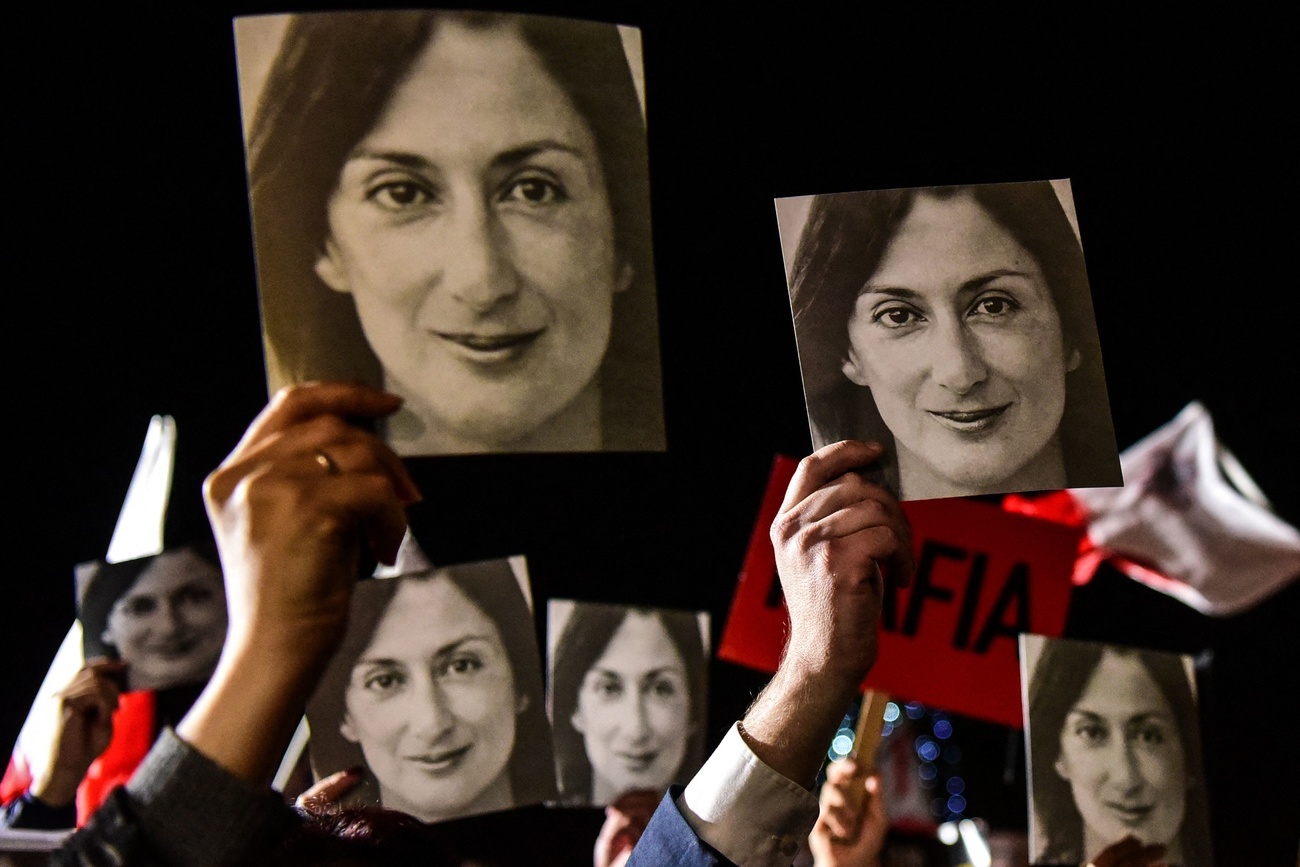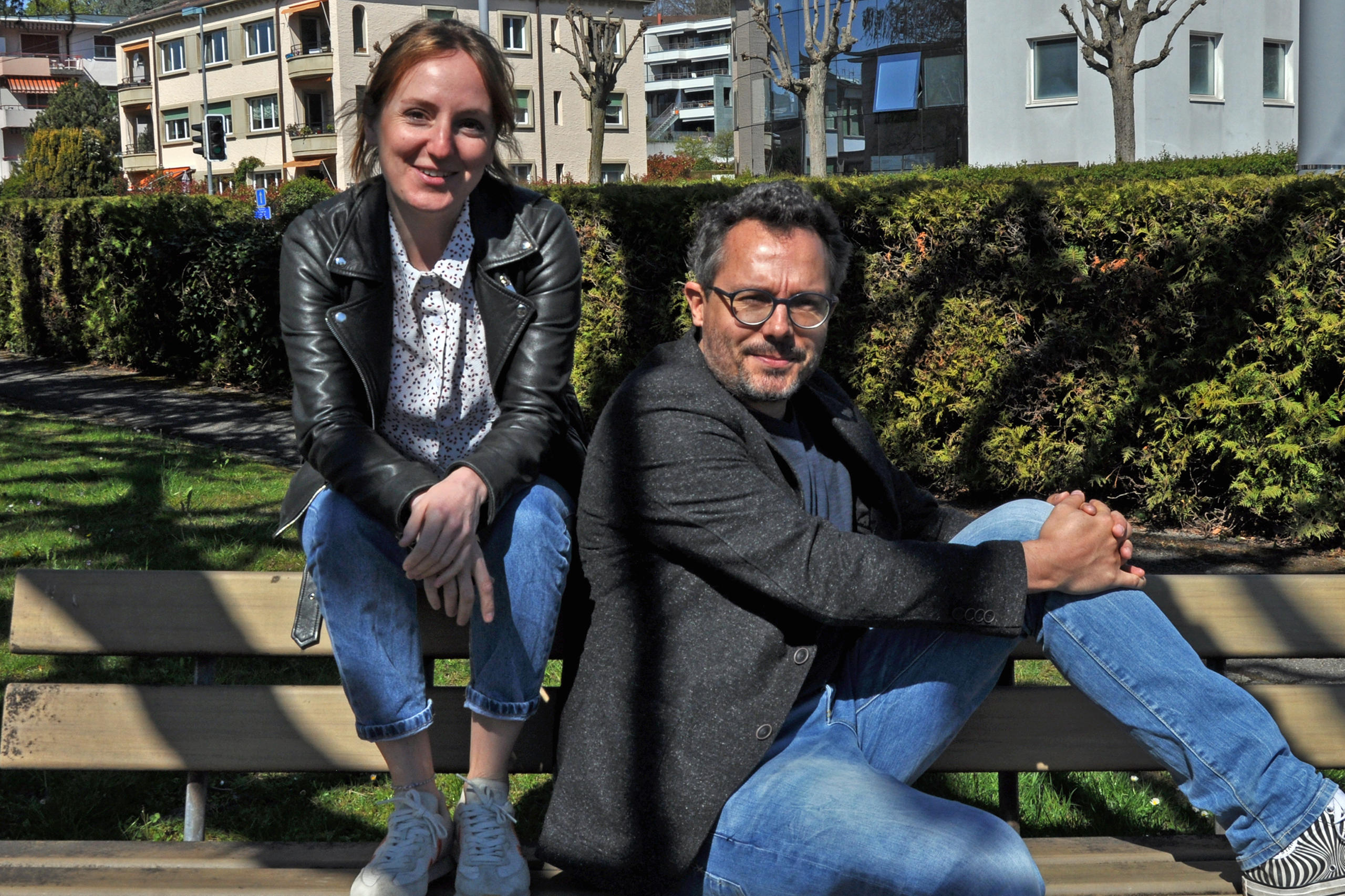
When white collar criminals try to silence the press

In Switzerland, as in the rest of Europe and the US, attempts to pressure and censor a financially fragile media are increasing. Some 30 non-government organisations warn that these judicial attacks threaten free speech.
It was one legal case too many for Marie Maurisse and François Pilet. Late January, the two founders of Gotham City, a Swiss online publication that specialises in white collar crime, find themselves in court for the fifth time in under 12 months. The reason? Having sought to report the conviction of a Geneva wealth fund manager who had hidden the funds of a rich foreign “philanthropist”.
The identity of the convicted wealth fund manager had been kept anonymous, in accordance with Switzerland’s strict rules governing the publication of names. The judge nevertheless believed that there was a risk the guilty party’s identity could be discerned from reading the article and banned its publication.
“It is a serious attack on freedom of the press, a real act of censorship,” argues Maurisse.
Although convinced of their rights, the two investigative journalists resigned themselves to dropping the story.
“We had already spent CHF3,000 (almost $3,300) on legal fees, we no longer had the money or energy necessary for an appeal. We therefore decided to give up on publishing this information,” says Maurisse.
“Chilling effect”
Professor of media law at the University of Italian-speaking Switzerland in Lugano, Bertil Cottier, has observed an increase in attempts in Switzerland to intimidate the media via the courts.
“Even if the journalist ultimately succeeds, all these legal proceedings are exhausting and dissuasive. It’s what we call the ‘chilling effect’, legal pressure aimed at discouraging journalists from fulfilling their role of society’s guard dog,” says Cottier.
The battle between extremely wealthy people who can hire the best lawyers and financially vulnerable media organisations is becoming more and more important, argues Cottier.
“A local newspaper or independent media outlets like Gotham City, Heidi.News, Bon pour la Tête, or Republik, are unable to pay several thousand francs in damages and interest from legal challenges. Yet it is precisely these small media outlets which participate in the pluralism and diversity of the press,” Cottier notes.
In the four other legal cases in which it has become embroiled recently, Gotham City has been targeted each time by so-called ‘super-provisional’ measures. These enable the judge to ban the publication of an article, often even before its publication and without consulting the journalists, when there is a proven ‘imminent’ risk to the person’s honour.
“It is a very powerful tool generally reserved for urgent cases. Yet today it is being used in a manner that is totally abusive,” says Pilet.

A censorship tool
Even though courts eventually acknowledged the information was in the public interest and authorised publication, these cases have left their mark. In two cases, the complainants did not pay the legal costs of the media outlets.
“In total, in 2020, we had to spend close to CHF20,000 on legal fees. That represents almost a month’s salary of our entire team of journalists,” notes Maurisse.
The founders of Gotham City remain firm in their aim to reveal affairs of corruption, fraud or money laundering, but they have become more prudent.
“We cannot fight every time. When we know that we are going to attract trouble, sometimes we drop it. That is auto-censorship,” laments Maurisse.
The trend is not reserved only for Switzerland. In the US, journalists are more and more often the target of repeated processes in the context of SLAPP (strategic lawsuit against public participation) or gagging lawsuits which make it possible to bring those who have participated in public debate before the courts. It is a means to pressure journalists, universities or non-government organisations which has quickly spread in Europe and in the heart of liberal democracies.
Together with some thirty non-government organisations, Reporters Without Borders (RSF) launched a platform in late March whose mission is to “denounce and fight the use of legal proceedings to intimidate and silence” critical voices on the European level. On May 18, RSF will award “shame prizes” to those businesses and political personalities who are the most litigious against journalists.
Sensitise judges
One of the triggering events for this initiative was the assassination, in October 2017, of Maltese journalist Daphne Caruana Galizia, who was investigating corruption cases.
“Yet, before being assassinated, Galizia was targeted by some 50 legal procedures. She spent an enormous amount of time in court, with the inhibiting effect, one can imagine, on her investigative work,” explains Denis Masmejan, secretary general of RSF Switzerland.
Although such a scenario has fortunately not yet occurred in Switzerland, Masmejan believes it is necessary to undertake awareness raising work amongst the Swiss justice system.
“Jurisprudence must evolve, notably around what concerns pre-emptive acts of censorship. Judges must apply the law in a sense that is favourable to journalists and that is respectful of freedom of the press,” he says.
Adopted by the Swiss parliament in 1984, the provisional and super-provisional measures require tougher criteria to be applied to the media because they affect the very core of press freedom. But they often create tension between the political, legal and media worlds, says Cottier.
“We saw this again in 2019, when several politicians in French-speaking regions [Pascal Broulis, Christophe Darbellay, Jacqueline de Quattro, and Pierre Maudet] tried to stop the publication of articles or books which were unfavourable to them,” he comments. One solution, believe the founders of Gotham City, would be legislative changes and the introduction of a surety (financial guarantees) when filing a request for super-provisional measures, as is the case for other judicial procedures.
“This would ensure that the plaintiffs, often rich businessmen based overseas, would be forced to pay the legal fees of the media unjustifiably attacked,” says Pilet.
Faced with the urgency of finding funds to cover their legal costs and in order not to jeopardise their young publication, Pilet and Maurisse have approached a non-profit that is open to the idea of providing financial support. The two journalists remain intent on exposing facts which wealthy litigants would rather stay hidden.
Translated from French by Sophie Douez

In compliance with the JTI standards
More: SWI swissinfo.ch certified by the Journalism Trust Initiative





























You can find an overview of ongoing debates with our journalists here . Please join us!
If you want to start a conversation about a topic raised in this article or want to report factual errors, email us at english@swissinfo.ch.